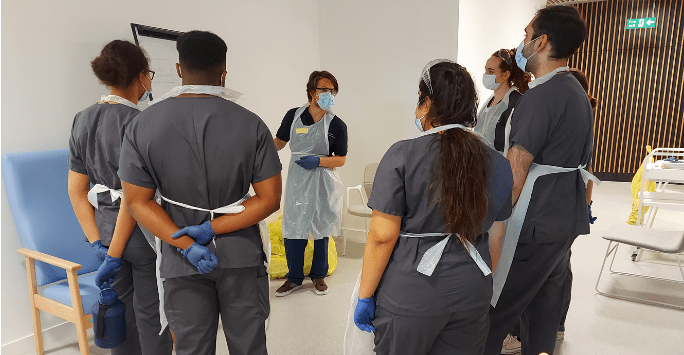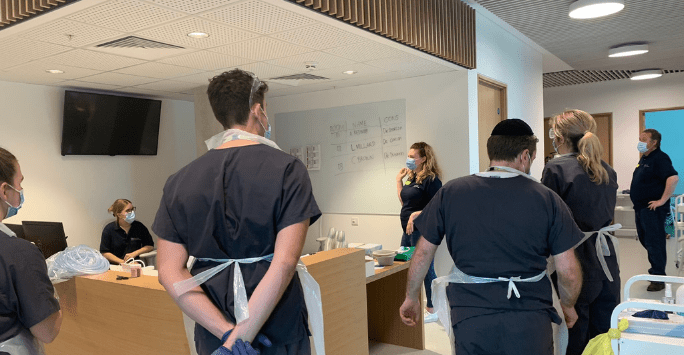
Simulation-based education at the School of Medicine takes on many different forms, often involving simulated patients, cutting edge technology and support and supervision from a host of experienced clinicians and topic experts, helping students prepare for work in the real world.
In October 2020, Jeff Goulding took up his position as a Lecturer in the Simulation Based Education team at Liverpool, followed shortly by Simulation Technician Leah Philips, who both join the existing Director of Simulation Dr Vidhi Taylor-Jones. Here, Jeff and Leah share what the team has in store for sim-based learning over the next academic year.
“It’s fair to say it’s been an interesting experience for Leah and I. However, as we reflect on the challenges we’ve overcome, we’re really proud of how we have adapted and developed our simulation offering during this time,” shares Jeff.
Leah agrees, “It’s been a challenging but thrilling ride. I’ve settled into the School, working closely with the simulation team and clinical skills technicians, and I now have a good understanding of the simulation technology we already have and where the opportunities are – including the School investing in a new human patient simulator."
We have a real sense that we’re building something special from the ground up. It’s exciting!
Adapting simulated learning in 2020-21
Like many other areas of teaching, simulation learning often had to be moved online over the past 18 months. However, the team have been delighted to see student evaluation remain overwhelmingly positive.
“Student doctors take part in simulated learning in years three, four and five of the MBChB programme. These sessions centre on various aspects of the role of a medic, and a major focus is on human factors - from managing your own reactions to stress, to working as part of a team and understanding the system in which you work,” explains Jeff.
This learning progresses through the academic years and supports the students’ preparation for the real world. This year’s Year 5 simulation event brought graduating students together for one final time on campus, with four days of in-person simulated sessions and a series of online workshops.
Great to see the @LivUniMedicine student doctors working well together in their #livdocsim simulation sessions today! And such an amazing backdrop of the Liverpool skyline from The Spine! @RCPhysicians @HazelRScott @LivUni @LMSSOnline pic.twitter.com/aqgOHvMZFk
— Nicola Eardley (@nicolaeardley) June 10, 2021
Jeff reflects, “The event we ran in June 2021 was a terrific success, but we want to move away from the idea of simulation as a standalone event delivered at the end of a student’s journey through the School."
Our aim is to make it a meaningful and powerful part of the curriculum that supports other elements and prepares the doctors of the future in the best way possible. This is just the beginning of that change.
Looking ahead to the new academic year
The team has big plans in place to take simulated learning to the next level for 2021-22, as the School welcomes students back to campus for an increased number of small-group teaching sessions.*
The Year Three simulated session, formerly known as CHIPS (Cedar House Interpersonal Simulation), has a new title, LivDocSim 1 – Awareness of Self and develops students’ skills in leadership and communication, with an expanded focus on self-awareness in the management of workload, stress, and conflicts.
Similarly, LivDocSim 2 – Awareness of Team, has been developed for Year Four students and builds on the theme of leadership from Year Three, including followership, situational awareness and decision making, as well as the importance of speaking up in the interests of safety.
Simulation-based education in Year Five expands to include workshops in systems and safety, which combine live lectures with real-life critical incidents, which students work to deconstruct using tools and techniques to develop an awareness of systems and how to work safely within them. These workshops will cover areas including error recognition and prevention, human performance limitation, procedural safety and safety culture.
Lecturer Jeff Goulding says these sessions will act as a primer for the School’s final piece in simulated learning, LivDocSim 3 – Awareness of System.
“Here, students will be tasked with managing various face-to-face simulated clinical scenarios featuring a mixture of human and systems errors. It will really give them the opportunity to apply their knowledge in a realistic clinical context. This time around we will also be filming the scenarios and playing them back during an interactive debrief to further increase the feedback and learning opportunities”
 Year Five Student Doctors in a handover scenario during simulated learning
Year Five Student Doctors in a handover scenario during simulated learning
As a Simulation Technician, Leah plays a vital role in ensuring sessions are as true to life and impactful as possible for student doctors: “To ensure that the students can fully immerse themselves in the scenarios, it will be important to make the environment they train in as realistic as possible."
We will be using a human patient simulator for the first time, alongside actors and volunteer patients, and the experience will run in near real time.
"It will be the best possible preparation for the real world, but in a completely safe environment.”
Jeff is also confident that the new expanded programme will mean students will experience simulation-based education which is coherent, complex and which takes them on a journey of awareness of self, team, and system, linked to and supportive of the wider curriculum, to prepare them for practice.*
“We’re really pleased and proud of the programme we’ve developed as a team. The next step is to integrate simulation even further into the curriculum so that its benefits can be fully realised. We are really looking forward to further developing our offering, making it even more integrated and relevant, so it continues to deliver and help set up the next generation of doctors for success!”
*All changes are subject to approval through FAQSC and the University Curriculum Quality assurance process.
Discover more
- Dive deeper into simulated learning at the School of Medicine with a look into last year’s Year Five LivDocSim event.
- Are you a clinician interested in leading a simulation education session at the School? Let us know by contacting jeff.goulding@liverpool.ac.uk.